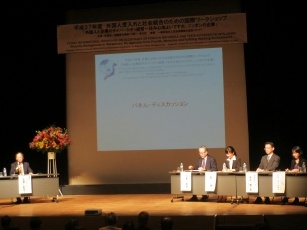VISA
FY2015 INTERNATIONAL WORKSHOP ON ACCEPTANCE OF FOREIGN NATIONALS AND THEIR INTEGRATION INTO JAPAN (Overview)
Diversity Management in Workplaces: Do Japanese Firms Provide Attractive and Fulfilling Working Environment?
March 14, 2016

On February 26 2016, the above-mentioned workshop was co-hosted in Curian, one of Shinagawa City's multipurpose halls, by the Ministry of Foreign Affairs of Japan, the International Organization for Migration (IOM) and Shinagawa City and was supported by the Council of Local Authorities for International Relations (CLAIR). About 180 people attended this workshop, including experts from Japan and abroad, officials from diplomatic corps in Japan, corporate managers, NGO workers, and ordinary citizens. The workshop opened with speeches given by Yoji Muto, State Minister for Foreign Affairs, and Takeshi Hamano, Mayor of Shinagawa City. Their speeches were followed by a keynote lecture delivered by William Lacy Swing, Director General of the International Organization for Migration (IOM) and presentations given by Japanese and international experts, and a panel discussion. This workshop is overviewed and evaluated as follows:
1 Overview and evaluation
(1)In this workshop, experts from Japan and overseas gave presentations on the development and management of international human resources based on their experiences and research data. Then, in the panel discussion that followed the presentations, panelists with different perspectives, such as managers in Japanese or foreign companies, foreign nationals working for Japanese companies, and human resources consultants, discussed the current situation and issues of diversity in Japanese business management.
(2)Although globalization has increased in Japanese companies, the companies need to make more effort to create workplaces where foreign national employees realize that they are accepted. Additionally, Japanese companies should also consider the fact that expatriates, in general, pursue opportunities to develop their careers more rapidly than Japanese people do. On the panelists' shared understanding of the circumstances, their candid discussion focused on how Japanese companies, superiors, and colleagues can help foreign employees, especially highly skilled ones, to exhibit their abilities and play active roles, which resulted in helpful suggestions.
(2)Although globalization has increased in Japanese companies, the companies need to make more effort to create workplaces where foreign national employees realize that they are accepted. Additionally, Japanese companies should also consider the fact that expatriates, in general, pursue opportunities to develop their careers more rapidly than Japanese people do. On the panelists' shared understanding of the circumstances, their candid discussion focused on how Japanese companies, superiors, and colleagues can help foreign employees, especially highly skilled ones, to exhibit their abilities and play active roles, which resulted in helpful suggestions.
2 Suggestions from the panelists and the Chairman’s statement (Chairman: Mr. Masayuki Kitaura, Counselor of the Japan Productivity Center)
(1) Suggestions from the panelists
- Japanese personnel systems should reflect an individual's perspective and be flexible to be changed when it is suggested some points. A clear evaluation system will facilitate employees' career development.
- Foreign employees' supervisors and colleagues should communicate with them proactively. This will help to promote growth of mutual understanding of each other and lead to further career development. Furthermore, it is essential that Japanese businesses create pleasant working environments, with employees in healthy relationships, evaluate employees accurately regardless of race or nationality, keep their fair evaluation systems visible, and clarify their corporate strategies.
- Japanese companies should no longer rely on tacit agreements or assumptions, but on communication based on the assumption that nothing has been agreed, which will strengthen mutual understanding of each other and build a foundation for embracing diverse cultures.
- Having the concept of accepting expatriates is not good enough. People should act in such a way that expatriates feel respected and included in the organization.

